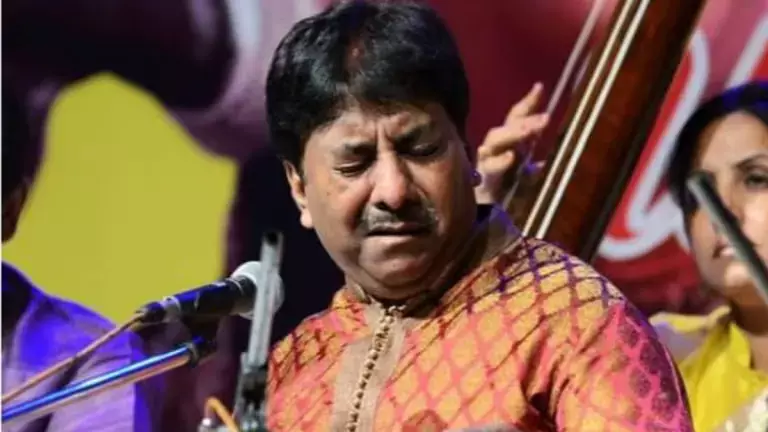Rashid Khan Mingles Into Eternity
The sun sets in music horizon’s utmost boundary

Ethereal journey of a silken voice that created a trance in the atmosphere has just come to an end. Rashid Khan is dead as the spirit has left his body, but he continues to live among the millions as his musical creations are immortal.
Representative of the Rampur-Sahaswan Gharana, this maestro left the mortal world at the early age of 55 after being afflicted with prostate cancer.
Kolkata, City of Joy, metropolis which the Ustad made his home since the age of 11, has plunged into sorrow as all those associated with the cultural world feel deprived of a classical singer who became a legend at an early age.
Born on July 1, 1968 in Sahaswan, Badayun, Uttar Pradesh, Ustad Rashid Khan Sahib was the great-grandson of Inayat Hussain Khan, founder of the Rampur-Sahaswan Gharana.
He soon became a household name in West Bengal, where the classical Hindustani music tradition in all its genres has graced the cultural stage at least for the last 200 years.
Personally speaking, I became a great fan of the Ustad after listening to his Yaad Piya Ki Aaye… Today, when we only have his presence through his songs, I pay tribute to him together with Ustad Bade Ghulam Ali Khan who originally sang this song.
Rashid Ji lived almost all through his life in Kolkata having first performed at the age of 11 in a programme in the town. Guess who was present there and praised the child’s voice? It was Pandit Ravi Shankar.
Ever since Rashid Ji moved to Kolkata in 1980, he had been perfecting his style in different genres. No wonder, he was most successful in singing filmy songs besides his pure Hindustani classical and semi-classical renditions.
Do you remember the sweet song Aaoge Jab Tum Saajna from Jab We Met? Ustad Ji infused full life to this song.
Of course, it was quite natural as Rashid Khan Sahib was an expert of sorts in different genres. No wonder, he sang songs of Rabindranath Tagore with supreme ease, as much musical ease as he would sing Albela Sajan Aayo Re in Raag Ahir Bhairav.
If you deeply follow the Sur and Sangeet of Ustad Ji, you will find that his Gayaki is very closely linked to both the Gwalior Gharana and the Rampur-Sahaswan Gharana. This is due to the fact that both these Gayeki styles are close to each other.
In fact, his Mamun Jaan or maternal uncle Ustad Ghulam Mustafa Khan Sahib was a great name in Gwalior Gharana. Rashid Ji took his training from him in this ancient Gharana. Subsequently, he took further training in the hands of his grandparent Ustad Nisar Hussein Khan Sahib, a maestro of the Rampur-Sahaswan Gharana.
The result was unique!
His mastery over both styles of Gayaki allowed him to render songs in, some sort of, unique blending. But he was versatile! He could sing all Rags and Hindustani genres with equal excellence.
What is most unique in his Gayeki, as I noticed though I am not a musical expert, is that he could render the medium-slow tempo, high-pitched or full-throated and slow-silvery songs with equal expertise, with a Maestro’s Midas Touch.
He was also an exponent of sorts in the Vilambit Khayal Gayaki.
Greatly influenced by Ustad Amir Khan and Pandit Bhimsen Joshi, our very own Rashid Ji made it big soon after joining a musical academy in Kolkata at the age of just 14. He sang several songs with Bhimsen Joshi including in Rag Miyan Ki Malhar and Rag Shankara.
By 1994, Rashid Ji was considered a musical prodigy.
This was quite natural as Ustad Nisar Khan, maestro of the metropolis of Kolkata, tolerated no dereliction in Swar Sadhna: the first step in musical journey that aims at perfectly tuning your voice to a particular Gayeki. It was some sort of ancient voice training. A young Rashid Khan would be made to practice a single note of the scale since early morning for several hours as the day progressed.
Often, he would have to begin his Swar Sadhna from 4 AM till late in the morning. And the result was the total perfection in voice making it capable of rendering a Rag on a silky-silvery note.
By 18, Rashid Ji was, more or less, an accomplished singer able to render different Ragas with their intricacies and Swar-related filigrees. For this, the TIC Sangeet Research Academy of Kolkata played a great role as the top musicians acted as teachers there.
Rashid Ji is simply interwoven in Kolkata’s musical world. He would very often be present at the Dover Lane Music event, the Behala Classical Festival and the ITC SRA Sangeet Sammelan, among others.
After being diagnosed with cancer, he showed some positive results to the treatment in Kolkata. But his condition suddenly deteriorated on December 23, 2023 and he was shifted to a ventilator for oxygen support.
But the icy hands of death snatched him from us.



